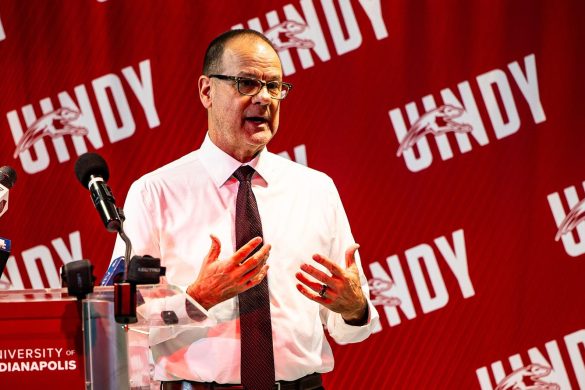The Kellogg Writers Series continued with a lecture from award-winning author Tracy Kidder on Tuesday, Nov. 12. Kidder writes creative nonfiction and literary journalism. He won the Pulitzer Prize in 1981 for his nonfiction book “The Soul of a New Machine.”
The lecture began with a welcome from University of Indianapolis President Robert Manuel, who then introduced Assistant Professor of English Kip Robisch. Robisch gave an introduction and praised Kidder for his writing.

Award-winning author Tracy Kidder spoke about his writing on Thursday, Nov. 12 in UIndy Hall. Photo by Jennifer Ulrey
“Every time I come to a Tracy Kidder paragraph, I know that I am not going to find pretentious prose,” Robisch said. “I’m not going to have to sloth through. I’m going to be challenged. His books are lean without being superficial. Sometimes you always feel like the dream is too short, that the book is almost too meaty, and you want more. Fortunately, you can just go to the next book. He’s got nine.”
After praising Kidder, Robisch welcomed him on stage to a round of applause. The basis of Kidder’s lecture was his 2003 novel, “Mountains Beyond Mountains.” The novel is a biography of physician and anthropologist Paul Farmer, who travels the world trying to fight infections and diseases.
Kidder also talked about his own writing techniques and how he goes about writing his books.
“I was, always have been, and still am afraid of loneliness, especially when I’m alone,” Kidder said. “When I have to be alone and want to be alone, I wish I weren’t alone. I am thinking first—all of the time—of the rough draft. When I begin to write, I require a private space, with a door that can be locked and a window no one can easily look into.”
He went on to talk more about the rough draft process and that he rarely writes fewer than 10 rough drafts for a book. He talked about constantly reading through manuscripts with his editor.
He spoke of his relationship with his longtime editor, Richard Todd. After they worked together for a while, Kidder had written several articles, including four Atlantic cover stories and two books.
“Both books had made money for their publishers,” Kidder said. “This meant it had become possible for me to write for a living. Anyone who gets to do that and doesn’t know he’s been lucky is probably demented. My working relationship with Todd was the largest part of my life.”
After Kidder concluded his lecture, he was able to take many questions from the audience. One audience member asked what piece of advice he could give to the upcoming generation of writers.
“I’d actually give you two pieces [of advice],” Kidder said. “To be a writer, you have to do two things above all: one is to write, and the other is to read. And if you really want to be a writer, you find a way to do it.”
Freshman nursing major Shayna Ritchie reflected on what she had heard.
“I liked hearing his experiences with the different people that he worked with, like Paul Farmer, and the relationship that he had with his editor,” Ritchie said.
Freshman exercise science major Erin Miller was already familiar with Kidder and thoroughly enjoyed the lecture.
“I’m not a big writer myself, so it was definitely interesting to see a professional writing aspect,” Miller said. “I came because I loved his book ‘Mountains Beyond Mountains,’ and I’m a big fan of Paul Farmer.”








